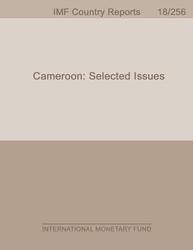
Cameroon: Selected Issues
Cameroon, like many other countries in sub-Saharan Africa, has increased public investment over the last decade in a bid to fill its large infrastructure gap.
READ MORE...
Volume/Issue:
Volume 2018
Issue 256
Publication date: August 2018
ISBN: 9781484373378
$18.00
Add to Cart by clicking price of the language and format you'd like to purchase
Available Languages and Formats
| English | ||||
| French |
Prices in red indicate formats that are not yet available but are forthcoming.
Topics covered in this book
This title contains information about the following subjects.
Click on a subject if you would like to see other titles with the same subjects.
Banks and Banking , Economics- Macroeconomics , Public Finance , Gender Studies , ISCR , CR , Cameroon , bank , IMF staff calculation , GDP , capital expenditure , education gender gap , gender inequality index , poverty impact , IMF staff , poverty reduction goal , Women , Income inequality , Gender inequality , Personal income , Sub-Saharan Africa , Global , West Africa , gender gaps in Cameroon , Policy recommendation , Policy simulation , poverty headcount , Financial inclusion
Also of interest
Summary
This Selected Issues paper aims at providing an empirical underpinning to fiscal policy reforms implemented by the authorities by estimating the size of fiscal multipliers in Cameroon, using a novel long quarterly data set and looking separately at the impact of changes in revenue, and government consumption and investment. The impact of government spending and taxes depends on country characteristics and the stage of the business cycle. The analysis shows that revenue and capital expenditure multipliers in Cameroon are small and comparable to those of other sub-Saharan African and low-income countries. The revenue multiplier is close to nil which implies that revenue-based fiscal consolidation would be less harmful to growth in the medium term. Compared to its peers in sub-Saharan Africa, Cameroon’s revenue multiplier is smaller as is its tax burden relative to the regional average. Conversely, government expenditure can more significantly affect output in the medium term, although the consumption multiplier is unexpectedly much higher than the investment one.
Copyright © 2010 - 2026
Powered by:
AIDC



